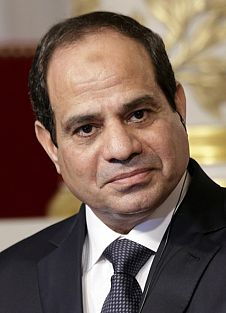Former Field Marshal Abdel Fattah Saeed El-Sisi was sworn into office as the 6th President of Egypt on 8 June 2014, having earlier that year resigned from his post as the Commander-in-Chief of the Egyptian Armed Forces. As a civilian, and as Deputy Prime Minister, Sisi won the presidential elections held in May 2014.
Birth: 19 November 1954 (Age: 70)
Source of Influence: Political
Influence: President of Egypt
School of Thought: Sunni, Traditional Sunni
Status: Featured in current year
Post Arab-Spring: Former Field Marshal Abdel Fattah Saeed El-Sisi removed Egypt’s first democratically elected president (Mohamed Morsi (d. 2019)) from power in 2013 in response to massive street protests against the Muslim Brotherhood-led government. Outbreaks of violence ensued across Egypt that included the death of many hundreds of protesters at the hands of pro-military police at the Raba’a Al-Adawiya Square in Cairo. Sisi then ran for office himself and was sworn into office as President of Egypt on 8 June 2014, having earlier that year resigned from his post as the Commander-in-Chief of the Egyptian Armed Forces.
President: Sisi was re-elected in 2018 with 97% of the vote for a second and final term. However, in 2019 the Presidential terms were extended to six years, and Sisi will likely run in, and win, the presidential elections that will be held from December 10-12, 2023. Originally planned for 2024, the presidential elections have been moved forward due to the country’s deepening political and economic crisis. More candidates are expected to run in these elections, but the situation is beginning to look more like the pre-Arab Spring autocratic rule of Hosni Mubarak.
Expectations: With the MB officially banned, its leadership and cadre either in prison or in exile, Egyptians looked to Sisi to resolve complex domestic and international issues. Sisi inherited a politically and economically battered Egypt with a weak infrastructure, bread and fuel shortages, and violent insurgency and unrest in Sinai. All of these have been resolved, say supporters of the President. Also, under Sisi, Egypt has enjoyed excellent relations with members of the Arab League, most notably with Saudi Arabia and the UAE. Sisi supported the blockade on Qatar as well as the GCC-led military intervention in Yemen. Regarding Africa, Sisi is prepared to mediate between warring parties in Sudan to reach a truce, and he will lead multinational peace talks related to Ethiopia’s Renaissance Dam, a project that threatens the Nile’s flow to Sudan and Egypt.
Challenges: With inflation running at 37%, the currency devalued (1 US dollar is 30 Egyptian pounds compared to 7 pounds when Sisi first came to power) and a huge international debt, economic hardship has been felt by most of the population. Human rights organizations estimate that the number of political prisoners in Egypt ranges between 65,000 to 70,000.
Mega Projects: The country’s economic hardships have not stopped several mega-projects, including the New Administrative Capital, which is in its first phase and has cost over $45 billion, a new “summer capital” on the north coast, a nuclear power plant, and a sustainable city in the Nile delta, amongst others.
113 million population of Egypt
6.7 million tonnes maximum capacity of Port Said



